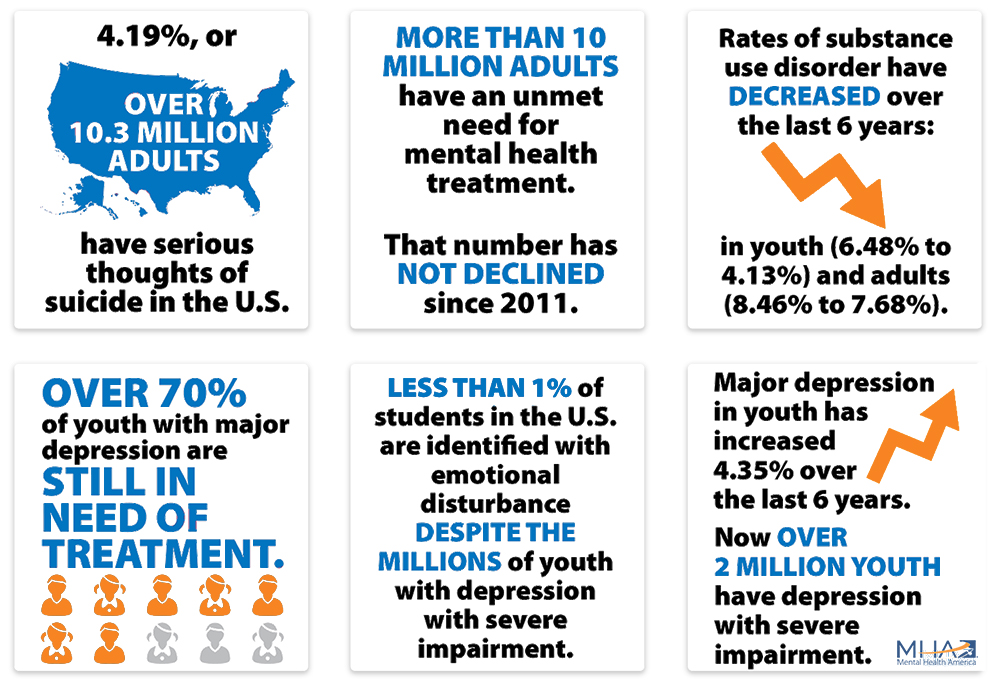
MHAPA Home » About Mental Health
About Mental Health

Learn the Facts | Access Peer Support | Lend Your Voice
About Mental Health
In 1990 the Americans with Disabilities Act (ADA) was passed. It was a comprehensive piece of civil rights legislation that prohibits discrimination and guarantees people with mental and physical disabilities the same rights and opportunities to participate in mainstream American life as every other citizen. Yet, decades later, negative and harmful attitudes about mental illnesses remain strong. Illegal and destructive behaviors against people with mental illnesses continue every day.
Understanding the facts about mental health and mental illnesses helps raise awareness about the realities of living with mental illness and the truth about the people and communities it impacts – which is all of us. In our efforts to help raise awareness about living with mental illness, we hope to improve the outcomes for individuals experiencing a mental health crisis or a lifelong mental illness.
Did you know:
- Nearly 1 in 5 American adults will have a diagnosable mental health condition in any given year. [Source]
- 46 percent of Americans will meet the criteria for a diagnosable mental health condition sometime in their life, and half of those people will develop conditions by the age of 14. [Source]
- More than 44 million adult Americans have a mental illness. [Source]
- More than 10 million adults have an unmet need for mental health treatment. [Source]

There are more than 200 classified mental health conditions.
Mental Illnesses are brain-based conditions that affect thinking, emotions, and behaviors. Since we all have brains, having some kind of mental health problem during your life is really common.
These include commonly known conditions such as:
- Anxiety
- Depression
- Substance Use Disorder
- Bipolar Disorder
- Post-Traumatic Stress Disorder (PTSD)
- Post-Partum Depression
- Schizophrenia
- Suicidal Thoughts
Your mental health can change when you encounter excessive stress or physical health conditions. Anything can have an impact on your mental health: your environment, your genetics, your life circumstances, or a combination. With proper diagnosis and care, many individuals can learn essential coping skills and recover from a mental illness or emotional disorder.
To hear personal descriptions of mental illness, visit feelslike.
Additional Resources:
Recognize Warning Signs
Mental Health 2020 Snapshot
Mental Health Data
Learn the Facts about Mental Illness
FACT: Mental Illnesses Can Impact Anyone
People living with mental illness are your family members, friends, coworkers, role models, teachers, health care professionals, shop clerks. They are the people you interact with every day. Some may be vocal about their illness, while others may attempt to hide it for fear of discrimination or shame of stigma. It impacts people of all ages, races, ethnicities, and income levels.
Like diabetes, cancer, and heart disease, mental illnesses are often biologically-based disorders and may be caused by a reaction to environmental stresses, genetic factors, biochemical imbalances, or a combination of these.
MYTH: Mental illness is a personal weakness or negative thinking, and it can be treated by a “change in attitude.”
For some, a mental illness is a lifelong condition. However, proper treatment enables many people with a mental illness to lead fulfilling and productive lives.
FACT: Mental Illness is a Protected Disability
Mental illness is the second leading cause of disability after heart disease. For all workers – with or without psychiatric disabilities – productivity is optimized when there is a close match between the employee’s needs and his or her working conditions. Individuals with a mental health disability are protected by the ADA. If you experience workplace harassment or discrimination as a result of a mental health disability, contact us.
FACT: Individuals with Mental Illnesses Can Recover with the Right Treatment
For decades, mental illnesses were thought to be permanent and untreatable. But the truth is that while these illnesses are persistent, research has shown that with treatment, the majority of people who have a mental illness achieve genuine improvement in their symptoms over time and lead stable, productive lives.
MYTH: Recovery from a Mental Illness is Impossible
As the treatment of mental illness has advanced, the focus has shifted from simply minimizing symptoms to true recovery, to reintegration into mainstream society, including (and perhaps most importantly) the world of work.
FACT: Mental Illness Impacts Children
About 20% of children have a diagnosable mental illness during a given year, and almost five million children live with a serious mental illness (one that significantly interferes with their day-to-day life).
FACT: Living with Mental Illness
To live healthy, fulfilled lives, people with mental illness have the same needs as those without mental illness: food, affordable and decent housing, meaningful work, healthcare coverage, access to a good education, and acceptance by family and peers.
FACT: People with Mental Illness are More Likely to be the Victims of Violent Crime than Perpetrators.
People living with mental illness experience discrimination every day at work, in school, with housing, and in their communities. The stigma of mental illness can be so strong that it leads people to avoid socializing with, employing, or living near persons who have a mental disorder.
Of people living with serious mental illness, fewer than half seek treatment, and those who do expend considerable effort keeping their treatment a secret for fear of discrimination.
MYTH: People Who Have a Mental Illness are Unpredictable, Potentially Violent and Dangerous.
This myth is reinforced by media portrayals of people who have a mental illness as frequently and randomly violent. However, a research literature review conducted at Cornell University found absolutely no evidence to support such portrayals. The fact is that the vast majority of individuals with psychiatric disabilities are neither dangerous nor violent.







